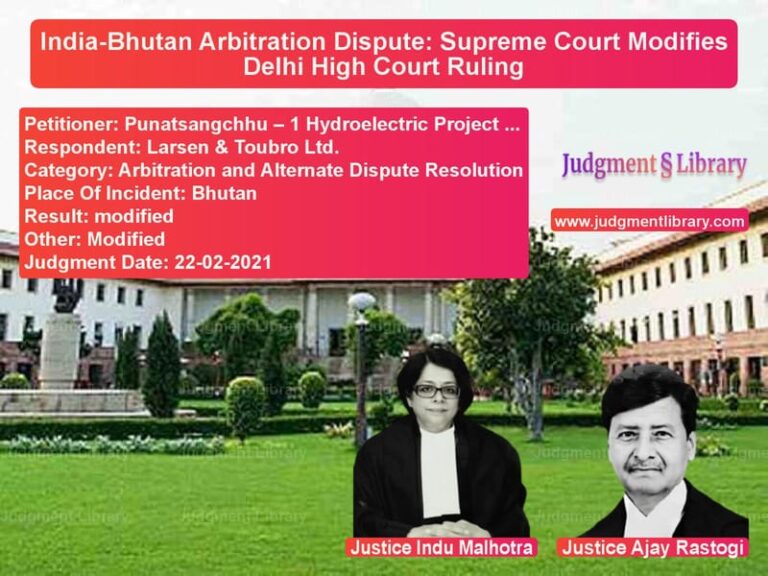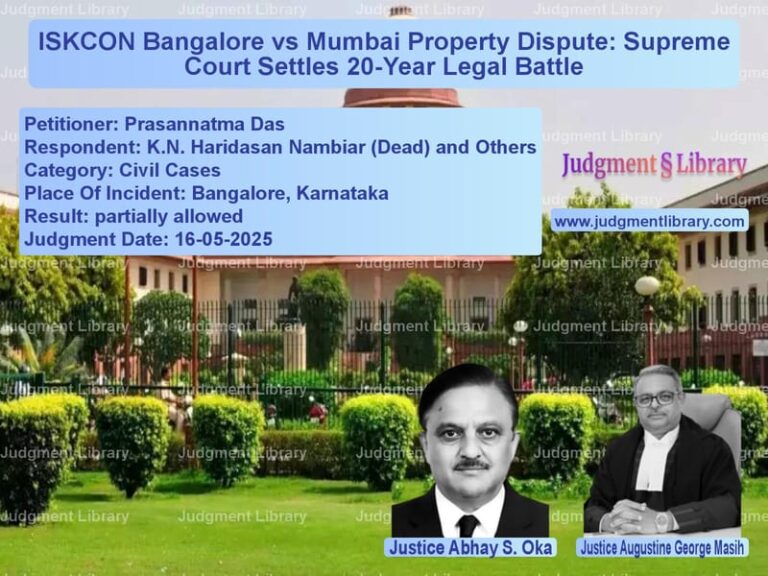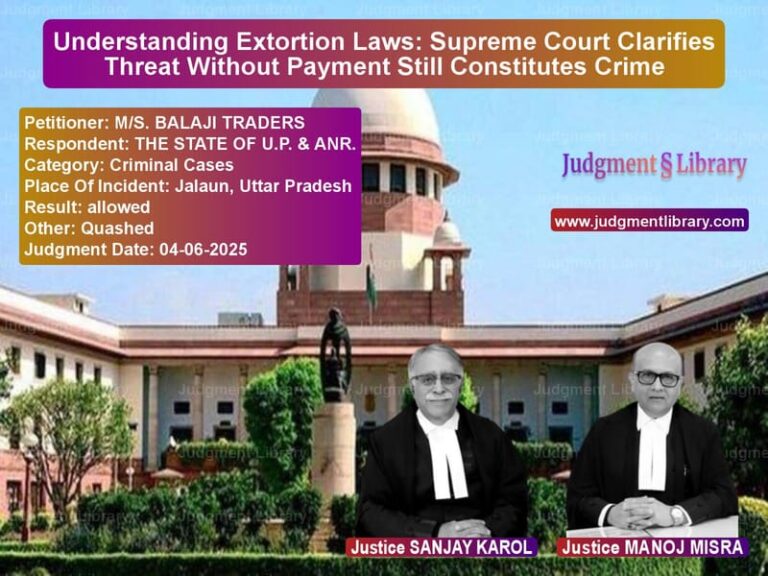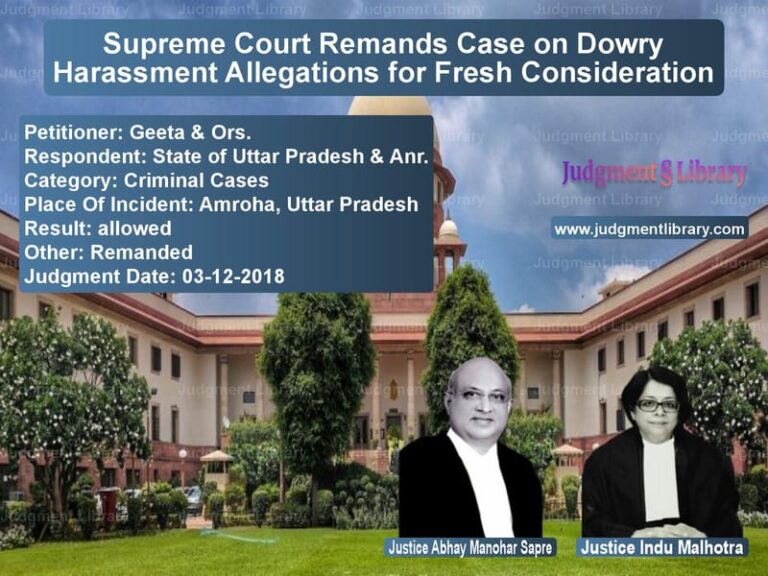Criminal Conviction and Murder: Legal Analysis of Appeal and Judicial Review
This case revolves around the appeal filed by the appellant, Subramanya, against the conviction handed down by the trial court for the murder of Kamalamma. The appellant had been sentenced to life imprisonment for his involvement in the death of the deceased, and the key issue before the Supreme Court was whether the conviction was valid based on the evidence presented during the trial. The case involves key issues related to the application of circumstantial evidence, witness credibility, and judicial review of the trial court’s judgment.
Background:
The incident that led to the conviction occurred in 2007, when Kamalamma was found murdered under suspicious circumstances. The appellant, Subramanya, was initially implicated based on circumstantial evidence, including motive and opportunity. The trial court convicted the appellant and sentenced him to life imprisonment. However, the appellant contested the decision, arguing that the circumstantial evidence did not conclusively prove his involvement in the murder.
The appellant argued that there was no direct evidence linking him to the crime, and the case was primarily based on circumstantial evidence. This appeal challenges the sufficiency of the evidence and the appropriateness of the legal interpretation in convicting the appellant.
Appellant’s Arguments:
The appellant, represented by his legal counsel, argued that the trial court had erroneously convicted him based on insufficient circumstantial evidence. He pointed out that the prosecution had failed to prove the guilt beyond reasonable doubt, as there were no direct eyewitnesses to the crime. The appellant’s counsel contended that the circumstantial evidence, which was primarily based on witness testimony, was not strong enough to convict him. The counsel emphasized that there were inconsistencies in the statements made by key witnesses, and their testimonies should not have been relied upon as the sole basis for the conviction.
The appellant also highlighted that the prosecution’s case was based on assumptions and conjectures, and there was no clear link established between the appellant and the murder. The defense raised concerns over the failure of the prosecution to establish a clear motive for the appellant’s alleged actions. Furthermore, the appellant’s counsel argued that the trial court had failed to consider the possibility of other suspects who may have been involved in the crime.
Respondent’s Arguments:
The respondent, represented by the State of Karnataka, contended that the circumstantial evidence presented was sufficient to prove the appellant’s guilt beyond reasonable doubt. The prosecution argued that the appellant had the motive, opportunity, and means to commit the crime, and the circumstantial evidence, when taken together, pointed conclusively to his involvement. The respondent pointed to the testimony of key witnesses who had testified about the appellant’s behavior before and after the murder, establishing a clear link between the appellant and the deceased.
The respondent further argued that the trial court had rightly considered the circumstantial evidence in its judgment, and the conviction should not be overturned on appeal. The prosecution emphasized that the appellant’s attempt to establish an alternative explanation for the events was unconvincing and should be rejected. The respondent also pointed out that the trial court had carefully evaluated the credibility of the witnesses, and their testimonies were consistent with the established facts of the case.
Court’s Analysis:
The Supreme Court reviewed the evidence presented in the case, particularly focusing on the application of circumstantial evidence. The Court acknowledged that while circumstantial evidence could form the basis of a conviction, it needed to be strong and conclusive, leaving no room for reasonable doubt. The Court emphasized the importance of examining the evidence in totality and ensuring that each piece of evidence corroborated the others in a manner that pointed to the appellant’s guilt.
The Court also examined the credibility of the witnesses and their testimonies. It was noted that while some inconsistencies existed in the witness statements, the overall testimony provided a coherent and consistent narrative of the events leading up to and following the murder. The Court ruled that the trial court had correctly relied on these testimonies to convict the appellant.
In addition, the Court considered the appellant’s argument regarding motive and opportunity. The Court found that the prosecution had sufficiently demonstrated that the appellant had both the motive and the opportunity to commit the crime, given his personal relationship with the deceased and the circumstances surrounding the murder. The Court concluded that the circumstantial evidence was sufficient to establish the appellant’s guilt beyond reasonable doubt.
Judgment:
The Supreme Court dismissed the appellant’s appeal, upholding the conviction. The Court found that the trial court had correctly applied the law and evaluated the circumstantial evidence. The Court concluded that the appellant had been correctly convicted for the murder of Kamalamma based on the available evidence. The Court also rejected the appellant’s arguments regarding the inconsistency of witness testimonies and the lack of direct evidence, affirming that the circumstantial evidence was sufficient for conviction.
Conclusion:
This case highlights the critical role of circumstantial evidence in criminal trials, particularly in cases where there is no direct eyewitness testimony. The Supreme Court’s decision reaffirms the principle that a conviction based on circumstantial evidence can be upheld if the evidence is strong, consistent, and points conclusively to the accused’s guilt. The judgment also underscores the importance of evaluating the credibility of witnesses and the overall coherence of the evidence presented in a case.
Petitioner Name: Subramanya.Respondent Name: State of Karnataka.Judgment By: Justice Dinesh Maheshwari, Justice Aniruddha Bose.Place Of Incident: Bangalore, Karnataka.Judgment Date: 13-10-2022.
Don’t miss out on the full details! Download the complete judgment in PDF format below and gain valuable insights instantly!
Download Judgment: subramanya-vs-state-of-karnataka-supreme-court-of-india-judgment-dated-13-10-2022.pdf
Directly Download Judgment: Directly download this Judgment
See all petitions in Murder Cases
See all petitions in Bail and Anticipatory Bail
See all petitions in Fraud and Forgery
See all petitions in Judgment by Dinesh Maheshwari
See all petitions in Judgment by Aniruddha Bose
See all petitions in dismissed
See all petitions in supreme court of India judgments October 2022
See all petitions in 2022 judgments
See all posts in Criminal Cases Category
See all allowed petitions in Criminal Cases Category
See all Dismissed petitions in Criminal Cases Category
See all partially allowed petitions in Criminal Cases Category







